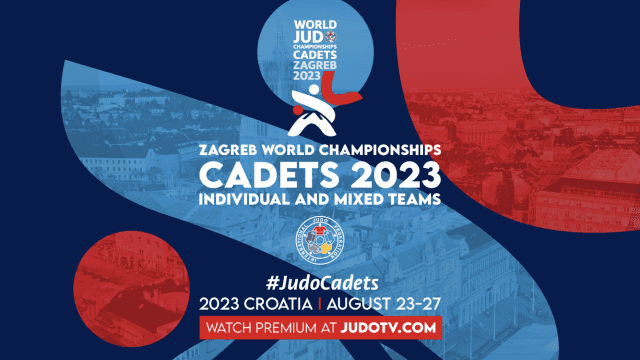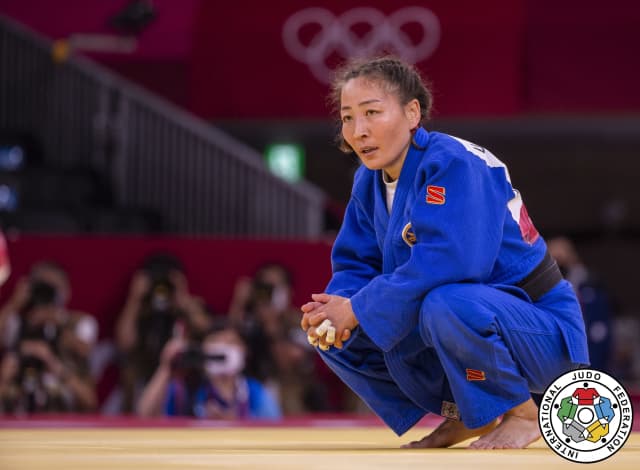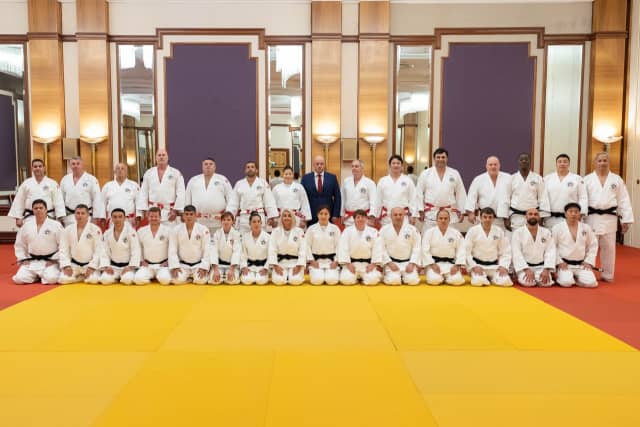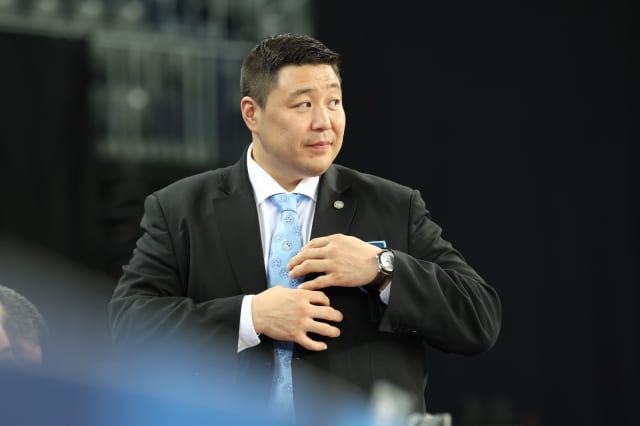Referees come from every corner of the globe, just as the delegations do. They each had an introduction to judo many years in the past, they had and have a life in the sport and a continued education that aligns with their passions. They have stories, have had challenges and also have a lot to experience to share.
Nyamtsogt Ganbold has climbed the refereeing ladder at home in Mongolia and is now a regular face on the World Judo Tour. During this festival, in Croatia, he is very happy to have the opportunity to not only referee the seniors of the World Judo Tour but to also officiate at a world championships, that of the cadets, the youngest age category competing on a global stage.
“My father was also a judoka, so I was born into a judo family; I really grew up in judo. He was an Olympian in 1988 in Seoul and in 1992, Barcelona. In 1985, at the Seoul World Championships he placed 5th.
I grew up liking judo; it was always close to me. When I was young my father carried me to training and I always felt wonderful around the sport and its people. Judo also has a big philosophy and education, a sport to build good people and I always liked that, I felt it was important.
I began practising properly at 12 and eventually joined the junior and then the senior national team. I participated at the junior worlds and Asian championships. I had a very good opponent at home who became the country's first Olympic champion, a top athlete, and I was proud to train with him and always have this opponent to push me but I stopped judo after an injury in my knee. Injury is the worst thing for athletes.
After I stopped competing, IJF Referee Supervisor Mr Bukhbat recommended I become a referee and actually I didn’t feel I could live without judo and so it was a great chance for me. I began at a local level and then progressed to national events before taking my continental exam in Yemen in 2008. That is a great memory for me and from that point I really began to love refereeing.
When I was an athlete I didn’t realise how hard the referees work. I always felt the need for fair play and wasn’t aware of how the referees felt while trying to make sure it was always fair; this became a new education. I felt wonderful on the mat, working hard and knowing that the job was very difficult. Now I know those referees, back when I was competing, really wanted to do the right things.
I had a teammate who was always complaining about referees. I dragged him into refereeing once I was on my new path and after one year he understood and also believed it was a great job. Now he works hard to develop his refereeing skills at local competitions in Mongolia, even though he is a coach, for the most part.
We have many good referees in Mongolia, including Mr Bukhbat and Olympic Referee Turbat Enkhtsetseg. The federation is doing well with President Battulga and from his leadership we had some world and Olympic medallists, top athletes. When we were young I watched my heroes like Jeon, Koga, Douillet and thought wow! Now we have many from Mongolia too, like Tsend-Ochir and Munkhbat. I think the rise in performance is directly linked to Mr Battulga’s leadership.
Mongolian national wrestling is also a big part of our culture and tradition. All families promote sports and wrestling and so I also did wrestling. All Mongolian men can wrestle and ride horses, it is how we grow up, but to come to the highest level of sport we have to find a way to reach the international level and for us it is judo. Judo is the top sport in Mongolia. The judo community is big at home and now the people really know the names of the best judoka; judo is very popular. We came a long way.
Just like when I was an athlete, as a referee I always want to do my best. I love being part of the IJF referee team, it’s really an honour to be with Mr Lascau, Mr Bagdasarov and Mr Jeon, the Head Referee Directors. I have perfect, kind colleagues and it’s a privilege to work with them. I think judo builds good people and so it is a pleasure to be among other people who are as passionate as me. I am proud to have Mr Lascau, the first non-Japanese Shidoin, as our guide. The Head Referee Directors have so much to do all at the same time; I don’t know how they manage it all but they do a really good job supporting us.
During the recent period there has been a lot of consistency of education, from the pre-event referee seminars with judogi and on the tatami, to the IJF Academy courses. These additions to our normal programme and the changes to our expectations are amazing for judo. These opportunities help to bring all of us a lot of knowledge and raise standards. Having practical examples, video analysis, open discussion, it is all good experience for all of us. To have good knowledge gives us confidence to do our job at the highest level possible. We have a shared understanding of the 100 Kodokan techniques and this, for example, helps us to communicate effectively about all judo situations.
Last year I refereed at the Guayaquil Junior World Championships and really they are almost like seniors. This is my first time refereeing cadets at the very top level. The youngest ones can really do everything but they can also be unpredictable, relying on their bodies, their opportunities and not so much on strategy. We really need to focus to ensure fair play, the right winners and above all safety, that is the number one thing.
I think it is at cadet age that judoka begin to learn that even with talent we have to work hard. In Mongolia we say it is 1% talent and 99% hard work that creates good athletes but it is the same for coaches and referees too.
All of the IJF team members are so professional and I feel proud to be working in this sport, always pushing the professional level. I am really grateful to Mr Vizer and Mr Battulga for all that we have achieved and can continue to achieve. It is a big challenge to build events at the level of the IJF but the whole team pulls each other up to create such an environment. For the cadets, this is fantastic and we see them grow into the occasion, raising themselves to bring their best ever performances. It is a platform for development for the athletes, the coaches and for the referees.“







